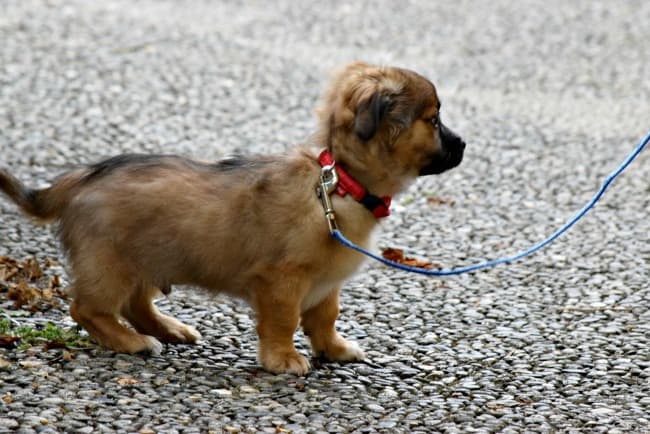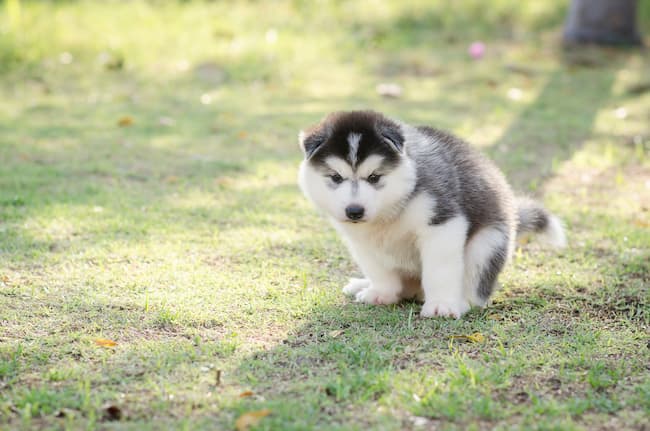FYI: If you buy something through a link on this site I may earn a commission - at NO extra cost to you.
Help For A Constipated Puppy
A constipated puppy is usually one who hasn't had a bowel movement in twenty-four hours, or is passing small, hard feces, often with difficulty.
Most often the causes of constipation in puppies are simple things... like not drinking enough water or getting too little exercise. In this case little Fido's inability to poop is likely to be the only sign of a problem.
Sometimes a medication side-effect, eating something that was inedible, or a physical problems (such as long, matted hair around the anus) can cause constipation in puppies. These types of constipation may, or may not, be serious.
Occasionally your puppy (or an adult dog) being unable to poop can be caused by something much more serious such as a blockage/bowel obstruction or dog bloat.
There are different treatment options for constipation in puppies and dogs, depending on the cause and how severe it is.
There are also ways to prevent the problem from happening in the first place.

If your puppy has eaten, or swallowed, anything he shouldn't or if he's constipated and showing any of these symptoms he needs veterinary help immediately, it could be an emergency situation:
- distress or pain (panting/pacing/shaking/drooling/vocalizing)
- vomiting
- retching
- loss of appetite
- diarrhea (yes, it can happen alongside a blockage)
- lethargy
- distended belly
What Causes Constipation In Puppies?
There are several different things that can make a pup constipated, they range from the simple and obvious, to the unexpected or unusual!
Your pup may not be constipated if....
you've only had him for about 24 - 48 hours, and he hasn't pooped yet.
This is because for the first day or so in a new home, a puppy is often stressed and may behave in unusual ways - including peeing less than normal and even refusing to poop!
Visit my Bringing Home A New Puppy page for more on these early days.
All puppies can get 'backed up' now and then, but if you have a very small, tiny or toy breed pup his chances of getting constipated are higher than those of a large or giant breed puppy.
Some of the most common causes of constipation in puppies include:
- Hairballs
If you thought it was just cats that got hairballs, think again. Dogs who groom/lick themselves a lot, especially if they're long haired, can swallow a lot of fur. This can then get balled up inside your pup and cause a blockage or slow down the intestinal tract. - Eating Odd Stuff
Puppies will be puppies, and they tend to want to eat everything that's not nailed down, and some things that are! However, ingesting inappropriate items can result in constipation due to an internal slowdown, or traffic jam. At worst it can cause a complete blockage (which requires urgent veterinary attention).
If your pup eats something he shouldn't but it's non-toxic and smooth/small enough to pass through his digestive system you could opt to watch carefully for it to 'come out the other end' within 12 - 24 hours... BUT.... if the item was a large/sharp/long, heavy or seems hazardous in any way it's best to have your pup examined by a veterinarian right away.
Most common non-edible items dogs swallow
Dogs, and especially puppies, are like living, breathing vacuum cleaners and tend to swallow up all kinds of things that are definitely not meant to be eaten!
Some are fairly innocuous and don't cause trouble, others can be risky or even downright dangerous.
The following items are often ingested by pups or dogs and have the potential to cause damage or obstruction, both of which can be deadly:
- Bones
- Cloth/fabric (socks and underwear are favorites!)
- Rocks/stones/gravel/wood chips
- Plastic (kids toys, pacifiers, food wrapping etc.)
- Fruit pits or corn cobs
- String/ribbon/yarn/electronics cords
- Coins or magnets
- Medications
Some medications taken to treat other conditions can also cause constipation as a side effect. Antihistamines are a common cause of this. So are diarrhea medications such as Immodium or Pepto Bismol (not surprisingly). It's never a good idea give your pup any kind of medication without clearing it with your vet first. Adverse, or unexpected, reactions can occur and it's always better to be safe than sorry. - Parasites
Parasites such as worms are more likely to cause diarrhea in puppies than constipation, but it can happen. Most puppies have worms at some point and to some degree, and these are going to cause problems if not treated properly, or proactively. - Medical Conditions
Although puppy constipation is rarely caused by any serious medical issues, it can happen, and in older dogs it's even more possible. Structural or skeletal abnormalities, hernias, or infection can sometimes cause puppies or dogs of all ages to have difficulty pooping properly. Kidney disease, prostate problems, tumors may cause constipation in adult dogs. Swallowing a foreign object that can't pass through the intestines, could cause a blockage (aka a bowel obstruction) which is life-threatening if not diagnosed and treated quickly.
A serious, often life-threatening condition called Bloat can also cause your puppy or dog to squat and strain, or retch and dry-heave. He may have a distended or hard belly, and pant, pace, whine or collapse. This is a veterinary emergency.
- 'Mechanical Constipation' or 'Psuedoconstipation'
This is caused by long hair around the dogs' anus/bottom getting tangled or matted. If it gets bad enough, the hair can prevent bowel movements, and you have a constipated puppy on your hands. - Surgery
Surgery, and the accompanying anesthesia and lack of activity during the recovery period, can cause your pups' digestive system to slow down - this may result in constipation. It's something worth remembering in the days after your pup has been spayed or neutered.
don't pull on that string!
Never pull on an object that is hanging from, or appears to be stuck in, your pup's anus!
Long or string-like foreign objects can get tangled internally and pulling on any part of them that is showing could cause massive, and irreparable harm.
Some objects may be too large for Fido to pass (and if they are and have got this far he is already very lucky),... if you notice something unusual blocking, or protruding from, your pup's bottom please get him to your vet asap so that it can be evaluated and removed safely.
How To Treat A Constipated Puppy
If, in spite of your best efforts, your pup becomes constipated there are some straightforward remedies that should get his bowels moving fairly quickly.

Adding certain things to their diet can often help a constipated puppy feel better.
Here are a few to try:
- Canned Pumpkin
A simple dog constipation remedy is to add a little canned pumpkin (NOT the pie filling variety, just good old plain pumpkin) in your pups' meals can be helpful. Add 1 teaspoon to 1 tablespoon depending on his size. Pureed pumpkin baby food also works. - Bran
Add some extra fiber in the form of Bran, Metamucil, Benefiber or similar products. About 1/2 teaspoon added to your pups meals for a few days. If your dog weighs over 50lbs you can use 1 tablespoon instead. 1 teaspoon of oat bran, or 2 teaspoons of Grape Nut flakes added to her food will work the same way. - Oil
Adding some extra oil to your pups diet can help to soften the stools and help his bowels keep moving along nicely. 1/2 tsp of olive oil added to his meals works. For more difficult cases, try 1 - 2 teaspoons of Mineral Oil, but don't do this for longer than 3 or 4 days. Mineral oil removes Vitamin A from your dog's body and it can be harmful if used for longer than this. - 'Special' Dog Foods
Some manufacturers sell dog food that is specifically formulated with extra fiber to help a constipated dog or puppy move their bowels regularly. Most foods contain between 2% and 4% fiber, Solid Gold dry dog food has 5%, and Hills offer two foods - I/D and W/D. These are available from most veterinary clinics. - Milk
Dogs don't digest cows' milk properly, and in normal circumstances it causes diarrhea. However, if you have a constipated puppy you can add 1/4 to 1/2 cup of milk to their food or water, or just give it to them to drink. Do this once a day for a couple of days and it should help loosen the bowels. - Keeping Long Hair Trimmed
If you have a constipated puppy due to long, tangled or matted hair around his little bottom, carefully trim it away with small scissors. Be very careful not to cut the skin. Keeping this hair short in the future should prevent a recurrence. If your pup has been constipated for a while, just trimming the hair may not be enough to get his bowels moving. You may need to also use another dog constipation remedy as well. - OTC Dog Constipation Remedies
There are a few OTC treatments available for a constipated dog or pup. To prevent, and eliminate, hairballs that are causing your dog's constipation, try Laxatone . It has been specifically formulated to prevent and eliminate those pesky hairballs, and has a laxative effect to help end your dogs' constipation.
Petwellbeing Smooth BM Gold is a totally natural product that can help to relieve canine constipation and also maintain healthy bowel function, without causing your puppy any discomfort.
There's also one more natural, gentle, herbal remedy that you might want to try... Only Natural Pet Laxa-Herb Herbal Formula which is a gentle, laxative herbal formula for overnight relief.
What to do in an emergency
If you know pretty quickly that your puppy has swallowed something potentially dangerous, you don't want to wait and try a constipation remedy once the problem already exists.
The first thing to do is to call your veterinarian for advice. Most often you'll be asked to bring your pup in for an exam, probably including x-rays, so that your vet can figure out what is going on, and what needs to be done (if anything).
However, if your pup ingests something toxic (solid or liquid), you may either want to make your first call to a Poison Control Hotline or an emergency pet hospital.
They may suggest you try to get your pup to vomit back up whatever he ate (but not ALWAYS, some things can do damage coming up as well as going down so never do this without professional approval!).
You can usually induce vomiting in dogs or puppies by giving them some 3% hydrogen peroxide by syringe. Vomiting usually happens fairly quickly. The correct dosage for this is 1 tsp per 5lbs of body weight (but don't give more than 9 tsps no matter how big your dog is).
Constipation Prevention for Puppies & Dogs
Here are some simple things you can do to help prevent your puppy from getting constipated in the first place....
- Increase fiber in his diet
Just like in people, a diet that contains enough fiber will help the digestive system to function properly. If your pup or dog is prone to constipation, choose a dog food with a minimum of 4% fiber, 5% is even better. Solid Gold Dry Dog Food has 5% fiber, and you can also buy special 'prescription' or high-fiber foods such as Hills I/D or W/D which have significantly higher fiber content (between 8 and 16%). Hills Foods are available from your veterinarian. Giving your puppy snacks of raw carrots, celery, apples or pears can also be beneficial. - Increase fluids
Your puppy needs access to fresh water at all times during the day. Aim for a daily minimum of about one ounce of water per pound of body weight, in hot weather, a centrally heated/dry environment or if your dog is very active he'll need more. If your pup has some issues with slow moving bowels and you can't seem to get him to drink more, you can always add some warm water to his dry food at one mealtime each day to get some more fluids into him. - Give him more exercise
Plenty of exercise is essential to keep your puppy health and happy. If you have a constipated puppy (or one who tendency towards it), increasing his exercise and activity level can help. The benefits are two-fold; firstly, the physical aspects of the exercise help to keep his digestive system and bowels 'moving along' preventing the sluggishness that can lead to constipation.
Secondly, long walks or a vigorous game of 'fetch' or frisbee keep him outside longer and help to give him plenty of time to eliminate when he has the chance. If you're housebreaking or crate training, and your pup doesn't do his business while your out, he may try to 'hold it' for too long, and this can cause the colon to slow down and the feces to get hard and difficult to pass. - Trim any extra long hair around the anus
This may sound odd, but sometimes in long haired breeds, the hair around the puppy's rear end becomes tangled or matted, and it actually physically prevents the puppy from having a bowel movement. If you have a constipated puppy who has long hair around his bottom, keeping it trimmed short will prevent this sort of 'mechanical constipation'.
CLICK HERE for an article on Puppy Constipation written exclusively for this website by Dr. Megan Teiber DVM
The bottom line (pun totally intended!)....
If your puppy is constipated and you're worried that he may have an intestinal blockage, bloat, or be in pain/distress then you need to have him seen by a vet right away.
If he seems happy and healthy apart from the constipation, but you've tried the tips on this page but your pup still can't pass any bowel movements then you need to consult a vet for advice.
For your peace of mind, puppy and dog health information on this site has been approved by veterinarian Dr. Megan Teiber, DVM
you might also like...
- Home
- Puppy Health Care
- A Constipated Puppy
FTC Disclosure: Some pages on this site contain affiliate links. I may earn on qualified purchases.





